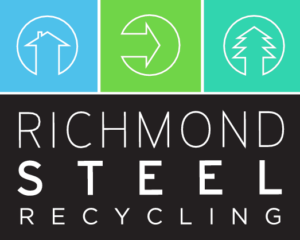The industrial demolition industry is a captivating realm, filled with thrills, challenges, and remarkable transformations. Richmond Steel Recycling (RSR), a prominent name in this dynamic field, stands out for its unwavering dedication to safety and sustainability. Unknown to many, RSR has its own Field Services division, which focuses on industrial decommissioning & demolishing, on-site torching, shearing, bin services and asset management services. In this blog, we embark on a journey to learn more about industrial demolition as we chat with Sebastien Rosner, RSR’s Vice President, and General Manager. Together, we’ll explore the different facets of this industry, the unique hurdles it presents, and the profound changes it has undergone over the past decade.
The Thrill of Industrial Demolition:
Industrial demolition is not merely about dismantling structures; it’s about breathing new life into the past and paving the way for a sustainable future. RSR’s commitment to recycling structures and machines, while safeguarding the environment, is truly inspiring. The RSR team takes immense pride in their role, recycling oil, gas, and mining infrastructure, and contributing to the circular economy.
Sebastien on the Excitement of Industrial Demolition:
Sebastien shares his perspective, “We are helping mining, oil and gas, and forestry companies to realize the terminal value of their obsolete equipment, while ensuring no environmental liability is left in the field. Our safety-first approach ensures these structures and machines are properly recycled into new commodities and find a new useful life. There is no reason to let an old dragline or building rust on a mine site at the end of its life when its raw material can be cost-effectively transformed into new steel. What personally excites me about this work is the intellectual challenge it presents. Each job is like a puzzle, requiring a unique solution. The variables at play—be it the material of the structure, environmental conditions, or even local regulations—make sure that no two jobs are the same. This diversity keeps me engaged and committed to finding the safest and most efficient solutions for each project.”
The Unique Challenges:
Effective and safe demolition isn’t just about picking up heavy equipment and tearing things down; it requires meticulous planning. RSR places safety at the forefront of every project, prioritizing risk mitigation at every stage. They ensure that each of their projects has a dedicated project manager to ensure smooth sailing every step of the way.
Sebastien on the Unique Challenges:
Sebastien emphasizes, “Before a piece of equipment or a building can be safely dismantled, an extensive amount of planning is required. At Richmond Steel Recycling, we prioritize risk mitigation at every stage of a project. Cutting large, heavy steel structures that are suspended 20 to 30 meters in the air is not just about using heavy machinery; it requires a nuanced understanding of physics and gravity. We also take into account environmental factors like wind speed and the integrity of the whole assembly. By making a few strategic cuts, we can bring down a structure in a controlled manner, ensuring the safety of our team and the surrounding environment.”
Industry Evolution Over the Last Decade:
Like all industries, change is inevitable. A common joke in the scrap metal industry is that we like things done the way they have been done historically. Recently however, even the scrap industry has evolved with the times.
Sebastien on the Industry Evolution:
“Concepts like Lean Demolition—an adaptation of Lean Manufacturing to demolition—and Theory of Constraints (TOC) have now become integral to the project planning and delivery process, ensuring that execution costs are minimized and project velocity is maximized. Being both safe AND efficient is crucial to a successful demolition project. The industry has become more professional, and Richmond Steel Recycling continues to lead the way in all elements of professionalism and risk management.”
Upcoming Trends in Industrial Demolition:
The world is increasingly focused on environmental responsibility and carbon emissions reduction. Although it has become a more recent initiative for some industries, RSR and the scrap metal recycling industry at large have held that ideology at the centre of our businesses since the beginning. Nevertheless, the industry remains mindful that its processes also generate emissions, making it vital to understand and improve this environmental balance, as well as constantly invest in new technologies and education to further enhance our understanding and positive impact on the environment.
Sebastien on Upcoming Trends:
Sebastien notes, “Our clients are increasingly interested in understanding the carbon emission savings generated by the demolition process. Many have pledged to become carbon-neutral by a specific date and will expect their contractors, including us, to contribute to this goal. By recycling steel (and other materials) and offsetting the need for new iron ore, our scrap recovered material provides a net environmental benefit in terms of CO2 emissions. However, we are mindful that our processes also generate emissions. Understanding this net balance and focusing on improving it is an area of work that will continue to grow in importance.”
RSR’s Vision for the Future:
As mining, oil, and gas industries evolve to reduce their environmental impact, RSR envisions itself as a partner in managing the complete process for their clients.
Sebastien on RSR’s Vision:
Sebastien elaborates, “The mining, oil, and gas industries are transforming and adapting rapidly. As they retool their processes in their journey to reduce carbon emissions and environmental impact, they also want to address the legacy processes still on their books. We are here as a partner to support their efforts and manage the end-of-life cycle of their old assets. Whether through the resale of components or the recycling of steel and non-ferrous materials, our services help them meet their pledges.”
RSR’s Commitment to Safety and Efficiency:
What sets RSR apart as an industry leader is their steadfast commitment to safety. Their team of field service experts work tirelessly to ensure they meet the highest standards of safety, efficiency, transparency and environmental awareness.
Sebastien on RSR’s Commitment to Safety and Efficiency:
Sebastien highlights, “Richmond Steel Recycling maintains an unwavering commitment to safety in the field while focusing on efficient processes. Demolition can be a hazardous activity if not executed properly. We work diligently at every step to identify and mitigate risks, ensuring safe project delivery. Each day is collaboratively planned by the team to ensure everyone is clear on potential risks and knows how to address them.”
Investment in Fire Prevention Technology:
In a world where forest fires are becoming more prevalent in Western Canada, fire prevention has become a top priority for companies operating in the region. RSR understands the importance of proactive fire prevention in their field operations.
Sebastien on Fire Prevention Technology:
Sebastien explains, “Forest fires are increasingly making headlines in Western Canada. Given that we cut metal in the field, Richmond Steel Recycling places a strong emphasis on fire prevention. Our crews are not only trained to combat incipient fires but are also equipped with the proper technology to be ready to respond. Through our fire watch program, we ensure that we are not the cause of large forest fires when doing our work.”
Leveraging Data and Analytics for Improvement:
In the dynamic world of demolition and recycling, the power of data and analytics is revolutionizing how companies operate. By tracking and analyzing activities, measuring tonnage production rates, and implementing continuous improvement methodologies, Sebastien’s industrial demolition and field services division is not only enhancing operational efficiency but also fine-tuning their quotation process with the insights derived from activity-based costing.
Sebastien on Data and Analytics:
Sebastien details, “Our demolition business uses data analytics to track activities and measure tonnage produced per hour for each of our processes—be it demolition, processing, loading, or transportation. Armed with this data, we focus intently on eliminating waste and bottlenecks in our production flow through continuous improvement methodologies. Additionally, we utilize activity-based costing, which informs our quotation process.”
With the help of our industry expert, Sebastien Rosner, we’ve embarked on a riveting journey through the industrial demolition industry, uncovering its challenges, evolution, and promising future. We’ve gained unique insights into Richmond Steel Recycling’s commitment to safety, sustainability, and efficiency, as well as their visionary approach to the changing landscape of industrial demolition. Be sure to check out everything RSR Field Services has to offer online or give us a call today to keep the conversation going 604-657-1003.

